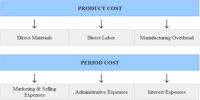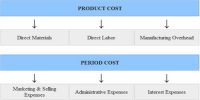Absorption Costing means that all of the manufacturing costs are absorbed by the units produced. In other words, the cost of a finished unit in inventory will include direct materials, direct labor, and both variable and fixed manufacturing overhead. As a result, absorption costing is also referred to as full costing or the full absorption method. This type of costing is required by the accounting standards to create an inventory valuation that is stated in an organization’s balance sheet. It will result in two categories of fixed overhead costs: those attributable to the cost of goods sold and those attributable to inventory.
The key costs assigned to products under an absorption costing system are:
- Direct materials.
- Direct labor.
- Variable manufacturing overhead.
- Fixed manufacturing overhead.
Absorption costing treats all manufacturing costs as product costs, regardless of whether they are variable or filed. Generally accepted accounting principles require the use of absorption costing for external reporting. Under absorption costing, normal manufacturing costs are considered product costs and included in inventory. It gives a much more complete and correct view on how much it actually costs to manufacture your inventory then the variable costing method.
















